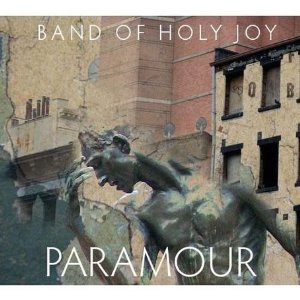"I propose
You obliterate your bad past
By any means you wish to choose
It’s up to you to lose
The life you so drearily had"
These days, Band of Holy Joy (and never has a group been better named) occupy a singular space – entirely out of time, entirely now. If their career has any kind of parallel, their closest forebears may well be The Fall. John Peel’s adage ‘Always the same, always different’ could apply to both groups, still firing on the fall-out energy of punk. They both have charismatic lead figures who have spent their entire careers worrying away at their own unique conception of the song. If Smith is Lovecraft via Rockabilly and Salford docks then Johny Brown is Burroughs through Coleridge via folk, cabaret and Newcastle. However, whilst both bands have equally had an astonishingly large number of members passing through their ranks, Band of Holy Joy work as a democratic and expansive enterprise, wide-open and unfolding whereas The Fall want to lock-down and refine (I often wonder if one day Smith will fire himself). Finally, the pair come with a weight of mythology behind them, and here lies the greatest difference – Smith becomes more hermetic with each new transmission whereas Brown’s gang belong to a more classically romantic tradition
Paramour has been gestating for a while: A tour of America, a powerful multi-media dramatic piece loosely inspired by the emotional chaos of Sid and Nancy’s apocalyptic time in New York (Troubled Sleep) played out in the labyrinthine tunnels of London’s Shunt, and an extraordinary tribute to William Burroughs in Paris last year. This is a song-cycle with a loose narrative thread- a piece of sonic cinema with beginning, middle and end: life, love, loss, redemption, no redemption. Band of Holy Joy on this outing sound like the crew of the Flying Dutchman after being permanently marooned in a lost New York.
‘We Were the Best of Friends’ captivates and steals you from the outset – it’s barely an intro at all, Andy Astle picks out a gentle repeating lullaby on guitar, Brown’s voice half spoken/ half sung croon "My thinking was contrived/ Most of my life a parade of lies/ A literary waltz of evasion and deception/ and such…" Chris Brierley’s violin? Well, you could roll out a thousand clichés and you won’t come close. You could talk about the technical brilliance of it but that’s all meaningless. Emotion drips from every tone – plaintive and plangent, anger, energy and bliss. Paul O’Donnell’s bass is fluid and versatile, sometimes a foundation, at others enjoying superb melodic runs, sometimes it does both. Finally there are smatterings of subtle electronics, spacious textures that verge on the midnight tropical.
These are restless songs though- they move like life. ‘Memory Counts’ begins as a speedy spacious drift building up a deep-bass momentum allowing Brown a defiant and bruised "otherwise those shysters win" before sliding into broken silence, his voice cracking "You held your breath/ my life ceased… to be". Holy Joy can shift from heartbreak to violence in the blink of an eye, which is what they do on ‘Road Work’, with its anguished and unrelenting screams of "Shoot the Freak" over aggressive guitar. They can summon Dionysius from the dark, as ‘City On Fire’ sets fire to flames and dares you not to dance through the ecstatic chaos. Finally, the come down comes to an end with the slow 3am waltz of ‘There’s a Bluebird on Your Shoulder’.
Paramour is a flaming comet, devastating and mature, confident and proud. This is what happens when you live to feel the power of life and that you have no choice but contain that force through the structures of a song. Paramour clocks in at just over 30 minutes – nothing extraneous, not a word, note or texture wasted, the very definition of poetry.
"Bullet in the barrel
Spin it in the frame
Let go the trigger
Watch the night burn in flames"


